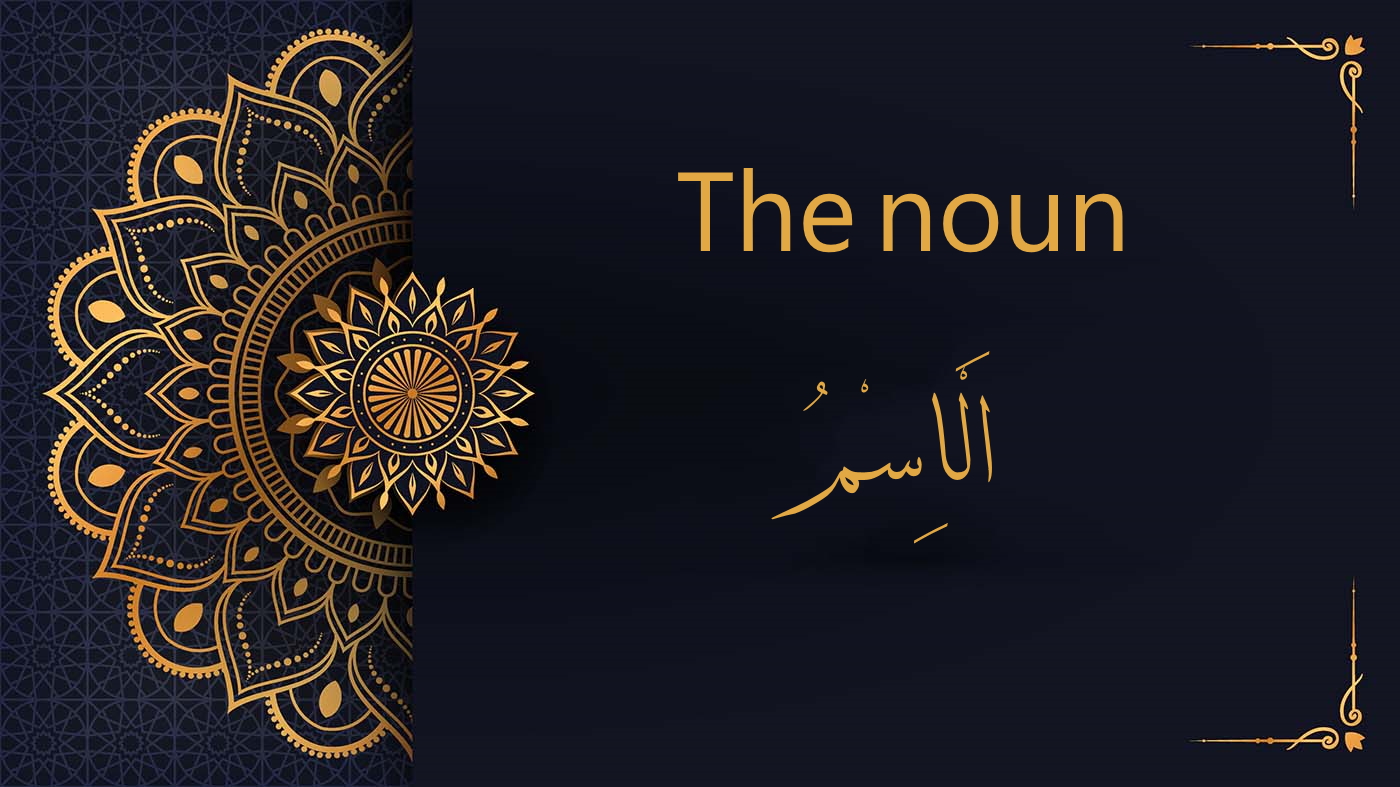
Nouns (اَلْإِسْمُ) in Arabic can be categorized into two types:
النَّكِرَةُ – Indefinite
المَعْرِفَةُ – definite
These refer to general names assigned to both living and non-living entities (common nouns). Indefinite nouns typically end with nunnation. (Tanween – تَنْوِين)
Examples:
رَجُلٌ – man
اِمْرَأَةٌ – woman
سَمَكٌ – fish
مَاءٌ – water
مُلْكٌ – kingdom
عَذَابٌ- punishment
Definite nouns are specific names attributed to a particular person, place, or object.
Example:
نُوْحٌ – Noah
حَامِدٌ – Hamid
أَحْمَدُ – Ahmed
إِبْراهِيْمُ – Ibrahim
بَيْتٌ – a house
كُرْسِيٌّ – a chair
قَلَمٌ – a pen
كِتَابٌ – un crayon
رَسُولٌ – un messager
Nunnation (tanween) is dropped under two circumstances: The indefinite noun can be made definite by adding a prefix.
اَلْ
اَلْ +بِنْتٌ = اَلْبِنْتُ
The + girl = The girl
اَلْ + نَبَأٌ = النَّبَأُ
The + news = The news
اَلْ + فَاكِهَةٌ = اَلْفَاكِهَةُ
The + fruit = The fruit
اَلْ + مَالِكٌ = اَلْمَالِكُ
The + ruler = The ruler
اِلْ + فِضَّةٌ = اَلفِضَّةُ
The + silver = The silver
اَلْ + يَوْمٌ = اَلْيَوْمُ
The + day = The day
Note: Proper nouns, such as Khalid (خَالِدٌ) or Hamid (حَامِدُ), are inherently definite. Thus, the prefix اِلْ is not added to them.
In a possessive construct, when two nouns are paired, the first noun drops its nunnation (tanween) but retains its harakat (short vowel marks). The second noun takes on a Kasrah:
-ِ
or tanween kasrah:
-ٍ
In the possessive construct, the possessor follows the item being possessed.
Examples:
نَارٌ + اَللَّهُ = نَارُ اللَّهِ
Fire + Allah = Fire of Allah
رَسُولٌ + اَللّهُ = رَسُولُ اَللَّهِ
Messenger + Allah = Messenger of Allah
أَصْحَابٌ + اَلْقُبُورُ = أَصْحَابُ الْقُبُورِ
People + the grave = People of the grave
كِتَابٌ + كُمْ = كِتَابُكُم
Book + you = Your book (plural)
بَيْتٌ + كَ = بَيْتُكَ
House + your = Your house (singular)
In the nominative case, when the noun acts as the subject (performer of the verb) of the sentence, it carries a dammah:
_ُ
or tanween dammah :
-ٌ
The noun with dammah will be in the nominative case.
Examples:
قَالَ نُوحٌ رَّبِّ
Noah Said (71:21)
وَانشَقَّ الْقَمَرُ
And the moon was split (54:1)
In the accusative case, when the noun serves as the object of the sentence, it takes on a fatha:
-َ
or tanwin fatha:
-ً
In this instance, the noun assumes the accusative form.
Examples:
جَعَلَ اللَّـهُ الْكَعْبَةَ
Allah has made the Kaaba (5:97)
وَضَرَبَ اللَّـهُ مَثَلًا
And Allah sets forth an example (66:11)
فَبَعَثَ اللَّـهُ غُرَابًا
“Then Allah sent a crow” (5:31)
In the genitive case, when a noun is preceded by a preposition, it carries a kasrah:
-ِ
or tanween kasrah:
-ٍ
In this context, the noun adopts the genitive form.
Examples:
مِن شَرِّ مَا خَلَقَ
“From the evil of that which He has created” (113:2)
فَهُوَ فِي عِيشَةٍ رَّاضِيَةٍ
“then he will lead a life of pleasure” (101:7)
عَلَىٰ صِرَاطٍ مُّسْتَقِيمٍ
“On the straight path” (36:4)
Some nouns such as:
زَيْنَبُ, مَرْيَمُ, فِرْعَوْنُ, أَحْمَدُ, إِبْرَاهِيممُ
are exceptions to the general rule and thus don’t carry nunnation (tanween) or kasrah, even in the genitive case:
-ِ
In the genitive case, it is indicated by a fatha:
-َ
Examples:
اذْهَبْ إِلَىٰ فِرْعَوْنَ
Go to Fir’awn; he has certainly rebelled” (79:17)
وَاذْكُرْ فِي الْكِتَابِ مَرْيَمَ
“And mention in the book (about) Maryam.” (19:16)
Typically, non-Arabic names and names exceeding three letters don’t carry nunnation (tanween).
Similarly, nouns used as adjectives for colors are free from nunnation (tanween).
Examples:
أَحْضَرُ – green
أَسْوَدُ – black
أَصْفَرُ – yellow
أَحْمَرُ – red
أَبْيَضُ – white
الَّذِي جَعَلَ لَكُم مِّنَ الشَّجَرِ الْأَخْضَرِ نَارًا
“He it is who made the fire for you from the green trees” (36:80)
حَتَّىٰ يَتَبَيَّنَ لَكُمُ الْخَيْطُ الْأَبْيَضُ
“You can distinguish the white thread” (2:187)
This Arabic lesson has concluded. Insha’Allah, our next topic will focus on the Dual in Arabic.
The Al-dirassa Institute provides an opportunity to learn Arabic effortlessly under the guidance of qualified teachers. If interested, we invite you to get in touch with us.
Discover the experiences of our delighted clients who have thoroughly enjoyed utilizing this standout feature.
Alhamdulillah I‘m very pleased with the arabic and Qur’an lessons I receive from teacher Umm Tasneem and I‘m also content with the al-dirassa administration team who were very quick in answering any questions I had. In a month I progressed a lot and I cannot wait to continue my studies with al-dirassa. May Allah reward everyone at al-dirassa.
Verified review - view original
My Qur’an teacher is fantastic, she teaches me in a loving and kind way where I look forward to the lessons and learn so much. My Arabic teacher is equally as nice and has a lot of patience with me, she has great expertise in the field and I’ve progressed really quickly with her. Thank you Al-dirassa!
Verified review - view original
Don’t want to go through the translation anymore?
30 free minutes with your qualified Egyptian teacher.

Al-dirassa Institute offers you a gift to help you begin your journey to being fluent in Arabic and learning the Quran.

Al-dirassa Institute offers you a gift to help you begin your journey to being fluent in Arabic and learning the Quran.